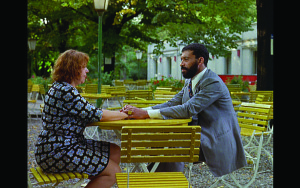Faculty Film Review: Ted Murphy
Immigration issues in Europe have reached such a pitch that it has been the lead story just about every night on National Public Radio (NPR) and other news venues for the last three weeks.
The refugee crisis has merged with the economic crisis by many third world countries who were forced to mortgage their economies to an international system that has lead to conditions where people are compelled to find somewhere- almost anywhere to migrate to in order to earn a living wage. We are witnessing an adjustment to new fears of protecting borders.
These issues have brought back to me a film that seems always relevant to what historically can be called The other”, “the stranger among us” and the ancient notion of xenos.
 Xenos means “the stranger”(fear of strangers is known as xenophobia) and is one of the fundamental ideas of much ancient text, from the Old and New Testament, to Homer and Ovid to the Koran. Giving comfort to the stranger is more than mere hospitality. It is a cultural virtue.
Xenos means “the stranger”(fear of strangers is known as xenophobia) and is one of the fundamental ideas of much ancient text, from the Old and New Testament, to Homer and Ovid to the Koran. Giving comfort to the stranger is more than mere hospitality. It is a cultural virtue.
Fassbinder’s 1974 masterful film Ali: Fear Eats The Soul tells the story of a 60-year-old widow Emmi whom one evening enters a bar to get out of the rain. The bar is filled with immigrants of Arabic North Africa. On a dare, a young woman taunts Ali (in his mid 30s) to go and ask Emmi to dance. One expects Ali to embarrass and humiliate Emmi. Everything is off in the scene…the age of the couple, the races of the couple, the alcohol among Islamic people, and the music…everything.
Fassbinder intentionally provokes as many conflicts with this scene as possible. The shock of the film is what follows. Ali and Emmi develop a connection. They fall in love. Their love is too much for everyone else in the film. Her adult children revolt when she introduces her new husband. All the people on both sides of the relationship are confused and against the relationship. It is a brilliant and subtle study of all of our deepest held prejudices. Racism, nationalism, ageism, classism, religious bigotry and even clever hints at homophobia (Fassbinder not only wrote and directed the film, he also plays Emmi’s son-in-law) Fassbinder was homosexual.
He died young at 37. He was also specifically suggesting in this film that Love between two people can and should never be anything but a celebration. Love is always a good thing. Love should break down all barriers. But in Ali: Fear Eats The Soul love becomes a brutal “fear filled” affair that leads to sadness and isolation.
Germany has historically not been a nation associated with open warm embrace of ‘the other”. At the time of this film the immigration crisis with Turkey was reaching a near panic state in West Germany.
Tribalism is perhaps one of our deepest held cultural connections. Marx believed that workers of vastly different cultures would come together from a common experience. For Marx, a British laborer would unite with a Russian who worked in similar status. Ultimately the world wars of the 20th century tragically revealed that tribalism and nationalism trump nearly every other connection humans could forge in society. Fassbinder’s film takes you into a world where strangers are asked to set aside their differences and embrace the power of Love. 1 John 4:18 states that “There is no fear in love. But perfect love drives out fear, because fear has to do with punishment. The one who fears is not made perfect in love.” (NIV) Ali tells Emmi that in Islam there is a saying that “Fear eats the soul”. The film ends with Emmi sitting beside Ali in a hospital where he has been taken after he collapses from complications of an ulcer. In Fassbinder’s film the inverse of 1 John 4:18 becomes the thesis of the film. Perfect fear casts out not only love but also every other human emotion.
Every night I see the faces of the various people who are trying to enter new countries …their faces are filled with fear. The faces of the people standing guard at their borders are filled with fear. The politicians currently running for nomination use rhetoric that is filled with fear about the stranger at our borders, the undocumented among us- the xenophobia is ramped up to shrill tones and the leaders in the polls are those who play the fear card to the fullest extent.
Christ welcomed the outsider. How we think about such issues reflects our embrace of the invitation of the gospel. The world is changing. The economic, environmental and political challenges in our near future will lead to an increase of migration. How we welcome those people will reflect much about our character. These are not simple ideas or challenges. The responsible questions of protecting borders while at the same time being open to those most in need are complex issues. We should never allow the pundits to try and capitalize on our easy slide into fear. Fassbinder offers up a story of profound implications. The story of two people from radically different worlds coming together is a metaphor as much relevant today as it was in 1974.
This film is in the Houghton college library film collection. It is Criterion 2 DVD set. Consider it as a means for generating discussion.
